

 |
||
 |
||
Vol. 5 (2): November 2002 |
Download this page
|
|
Greece / Italy / Madeira / Mauritania & Western Sahara / Turkey
Greece
|
||||||||||||||||||
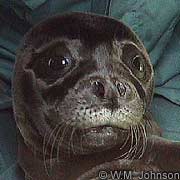 |
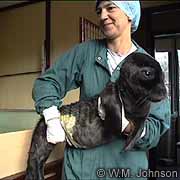 |
|
|
Chionati in intensive care at the STRC on Alonissos |
||
MOm’s consultant veterinarian from the Veterinary School of Thessaloniki, Dr. Anastasia Komnenou, and a nurse from the Seal Rehabilitation and Research Centre of Pieterburen, the Netherlands, arrived two days later.
The pup, christened "Chionati" (Snow White) by its discoverers on Evia – a somewhat curious choice given its chocolate-brown laguno – was quickly weaned onto fish porridge, with feedings taking place round the clock every three hours.
An umbilicus infection has required a course of antibiotics but, so far, the pup appears to be responding to treatment. MOm, however, remains cautious, pointing out that even with the best of treatment orphaned monk seal pups this young may only have a 50% chance of survival.
Tragically, Chionati died on 8 November. Initial necropsy results, reports Jeny Androukaki, indicate that the seal pup died of starvation, despite adequate consumption of food in the five days prior to its death. In what appears to be a recurrent problem affecting Mediterranean monk seal pups in rehab – particularly animals only a few weeks old with low body weight – malabsorption (defective or inadequate absorption of nutrients from the intestinal tract) is being postulated as a possible cause of death. Further (microscopic) results are expected in due course. Dr. Thijs Kuiken of Erasmus University, Rotterdam, the Netherlands, performed the necropsy on Alonissos.
An apparent reluctance by the Greek Ministry of Environment and Public Works to honour its financial commitments to the flagship National Marine Park of Alonissos-Northern Sporades (NMPANS) is severely jeopardizing monk seal conservation efforts in the area, according to sources in Athens.
Deputy Minister Rodoula Zisi reaffirmed the government’s commitment to the NMPANS during a high-profile visit to Alonissos on 15 March 2002 [see Sporades receives ministerial commitment, TMG 5 (1): May 2002]. Then, on 5 June, World Environment Day, the Minister of Environment, Vaso Papandreou, stated that "we are not celebrating the environment only to forget it for another year."
Although Ms. Zisi has successfully pursued the establishment of the Park’s management body through the Greek Parliament – a significant milestone in the long-term conservation of the area – no government funding has been made available to vital conservation efforts in the Sporades since June 2001. With the funding crunch already at crisis point, guarding, monitoring, education and public awareness activities are facing serious disruption and even collapse, despite MOm’s best efforts to cover the budget shortfall from other sources. Making matters even worse, the crisis in the NMPANS also coincided with the critical high summer tourist season, when threats to the Park and its vulnerable monk seals are most apparent.
A breaking news item carried on www.monachus-guardian.org and in other media in June resulted in several hundred protest letters being emailed to the Minister and Deputy Minister of Environment. So far, however, there is still no sign that the Ministry is making good on its promises.
Readers who have not yet registered their concerns with the Ministry are encouraged to do so by signing our automated online petition.
After many years of much-criticized delay, the Greek government has finally passed necessary legislation to establish the NMPANS management authority, an essential step that will hopefully streamline the Park's day-to-day operation while also helping to nurture sustainable development patterns in the area [see All At Sea – Adrift in the Northern Sporades Marine Park, TMG 4 (2): November 2001].
A large question mark, however, continues to hang over the composition of the management body, and whether conservation interests will be adequately represented.
While primary stakeholders – such as the tourism and fishing industries – are likely to be key players in the management body, reflecting the importance accorded to their participation in the conservation process, conservationists believe that the interests of monk seals must also be heard loud and clear. The Greek Environment Ministry, however, continues to prevaricate – even though the choice of candidate seems logical enough to most outside observers.
Leading NGO MOm has been consistently applying management actions in the NMPANS for years – including guarding and monitoring, education and public awareness, rescue and rehabilitation – essentially fulfilling the government's own responsibilities.
Marking significant progress in MOm's EU-supported efforts to establish marine reserves elsewhere in the Aegean [see LIFE funding for Natura 2000 areas, TMG 4 (2): November 2001], the Greek government has recently completed legal procedures establishing the management authority for the Karpathos-Saria area. A Special Environmental Study, which proposes the creation an "Eco-development Area" within the administrative borders of the Olympos area in Karpathos, is being forwarded to the Ministry for the Environment, Urban Planning and Public Works for approval. – MOm.
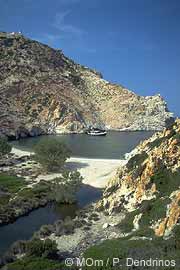 |
|
|
Unspoilt Kimolos-Polyaigos: an enormous potential for local inhabitants – humans as well as seals |
Meanwhile, uncertainty lingers in MOm's other Natura 2000 target area, the Kimolos-Polyaigos complex in the Cyclades, where the establishment of a National Marine Park has been proposed [see LIFE funding for Natura 2000 areas, TMG 4 (2): November 2001 and see Natura 2000 areas continue to attract support, TMG 3 (1): May 2000].
While the government has continued to voice its support for the project, which would protect one of the monk seal's most important breeding sites in the Aegean, local inhabitants, it seems, have yet to be fully convinced that the Park would benefit rather than harm their livelihoods. In an effort to address those concerns, the Environment Ministry convened a meeting in Athens on 12 September 2002 allowing local stakeholders, MOm staff members and government officials to participate in a broad exchange of views on the subject. Those in favour of the conservation plan – including the then mayor of the island – took pains to emphasise the potential economic benefits of establishing the National Marine Park of Kimolos, including ecotourism.
At present, Kimolos, an isolated, unspoilt island despite its presence in the tourism-intensive Cyclades, possesses few employment opportunities, particularly for the young. The largest single employer, a mining concern, provides jobs to a handful of locals. A properly designed and administered Marine Park, on the other hand, could be expected to employ many more, as well as bring economic benefits to other sectors in the local economy. Unfortunately, the government's failure to meet its financial obligations to the marine parks of Zakynthos and Alonissos-Northern Sporades – spawning serious management crises in both areas – has hardly proved the best of advertisements for a National Marine Park of Kimolos.
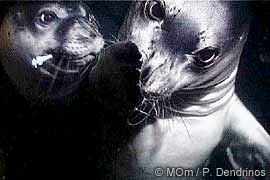 |
|
|
Kimolos pups |
Lack of trust in government assurances may be at least partly to blame for the 13 October local election results, which saw Kimolos' park-supporting mayor voted out of office.
Undaunted by recent developments, MOm continues to pursue its conservation objectives in the area, convinced that local people will eventually recognise the economic and conservation logic of the Marine Park.
The Kimolos-Polyaigos area is believed to be home to one of Greece's most important monk seal colonies. Between 1997 and 2000, the population in the area was estimated at 30-45 individuals by MOm researchers, with nine pups being born during the 2001-2002 season [see Season's Recruits, TMG 5 (1): May 2002].
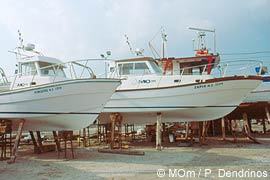 |
|
|
MOm research boats 'Kimolos' and 'Saria' ready for launch |
The construction and registration of two new monitoring and research boats for the Kimolos and Karpathos Natura 2000 areas was completed during September. The vessels 'Kimolos', an 8.5 meter speedboat and 'Saria', a 9.5-metre speedboat of similar design, are equipped with radar and VHS transmitters.
Following their delivery to the project sites, and the selection and training of locally-recruited crew members by MOm's management team, the boats are now ready to undertake their assigned monitoring and research duties. As residents of the two islands, the new crew members are expected to bring a wealth of local knowledge and experience to the monitoring programme. – MOm.
MOm researchers recorded the first monk seal births of the new 2002-2003 reproduction season during summer. So far, 9 newborn pups have been observed in the National Marine Park of Alonissos-Northern Sporades, 5 in the Kimolos-Polyaigos area and 5 in the N. Karpathos area. On-site surveys will continue for as long as weather conditions permit, with MOm's research and guarding vessels visiting breeding caves in order to gather new scientific data on the reproduction of the species.
Due to particularly severe and unpredictable weather conditions prevailing lately throughout Greece, it is likely that some newborn seals will lose their mothers and may be washed ashore. Anyone witnessing such an occurrence is kindly asked to contact MOm by phone without delay on 210-5222888. The organisation's Rescue Team will be on a 24-hour standby, ready to provide first aid to any seal in distress. – Panos Dendrinos & Jeny Androukaki, MOm.
On 2 July 2002, MOm received a prestigious award by the Union of Greek Shipowners and the George P. Livanos Foundation in recognition of its contribution to the protection of the marine environment. Special acknowledgement was given to the organisation's guarding activities in the National Marine Park of Alonissos-Northern Sporades, implemented systematically since 1991.
Aside from the moral encouragement offered by the award, the accompanying $20,000 prize also helped ease temporarily the organisation's severe financial hardship. Despite its status as the number one endangered marine mammal of Europe, monk seal conservation activities continue to be hampered by chronic lack of funding. – MOm.
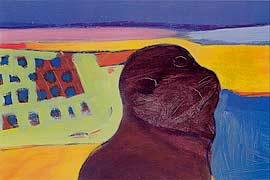 |
|
|
Monk seal greeting card issued by Piraeus Bank, marking its support of MOm's conservation activities in the NMPANS |
Responding to the funding crisis affecting conservation activities in the National Marine Park of Alonissos-Northern Sporades, the Piraeus Bank Group has agreed to sponsor the continuing operation of the Biological Research Station at Gerakas, Alonissos, until the end of the year.
Under an agreement with the Greek Environment Ministry, MOm uses the Station as a base for its research and conservation activities in the Sporades, also operating an exhibition centre for visitors. Agreed funding support from the government to operate the Station, however, has yet to materialise. – MOm.
Again this summer, MOm's Public Awareness Campaign brought the monk seal conservation message to thousands of local residents and Greek and foreign visitors in key conservation areas in the Aegean. During the season, dozens of volunteers staffed MOm's Information Centres in Alonissos, Skopelos and N. Karpathos. For the first time this year, a centre also functioned on the island of Kimolos, the site of a prospective marine park.
The information centres and kiosks serving the Northern Sporades Marine Park received 11,587 visitors, of which 6,633 were Greek and 4,954 were visitors from abroad.
In the Cyclades, the newly-established Kimolos Information Centre received 1,245 visitors (964 Greek and 281 foreign), while in the eastern Aegean the N. Karpathos Centre hosted 1,315 visitors (537 Greek and 778 foreign). – Maria Dimitropoulou, MOm.
Two junior libraries with an environmental focus have been established by MOm in the prospective protected areas of Kimolos and N. Karpathos – an integral part of the organisation's educational outreach programme.
To date, each library features an on-line computer, 240 book titles, 67 videotapes, 52 issues of periodical publications, 24 CD-ROMs and 6 board games. The collection is divided into 34 themes with more than half focusing directly on the environment: Recycling, Endangered Species, Literature and Environment, General Environmental issues, Environment and Society, Environment and Culture, Environmental Protection, Nature-Science-History and Natural Phenomena. The remaining 25 units cover a wider range of other subjects such as sports, archaeology, astronomy, biology, history, literature (classical and contemporary), mythology, fiction, art and technology. The libraries cover topics of interest for all ages between 2 and 18 years, without necessarily excluding older people.
The libraries opened their doors in January 2002. Since then, over a 100 books have been taken out on loan in Kimolos and 58 books and 22 CD-ROMS in N. Karpathos.
A reading contest for children aged 9-15, entitled "Reading Battles", was also held successfully in June 2002. – MOm.
Following a lengthy legal procedure to wind-up its activities, the Save the Mediterranean Monk Seal Foundation [see Seal Foundation Still in Limbo, TMG 1 (1): May 1998] has donated all of its accrued assets to the leading Monachus conservation NGO in Greece. MOm received a total of $247,000 from the Foundation in spring this year, which the organisation immediately committed to marine park guarding activities, education and public awareness.
The funding allocation was made possible through the generosity of the Foundation's founding members, including Bellerive Foundation President Prince Sadruddin Aga Khan, ship-owners Andreas Potamianos and the late George P. Livanos, and brandy heir Spyros Metaxas.
MOm's Rehabilitation Team, in cooperation with its Kimolos Field Group, exhumed the skeleton of a dead seal in the Apollonia area of Milos in March this year. The seal, an adult female, died after being shot in the abdominal area and had been buried in the same spot following an necropsy in August 1999. Its skull will be used for a morphological study, while tooth analysis will be used to determine the age of the seal. – Jeny Androukaki, MOm.
Stung by widespread criticism of its decision to withdraw from monk seal conservation [IFAW bows out, TMG 5 (1): May 2002], the International Fund for Animal Welfare reacted sympathetically to news this summer that a funding crisis was jeopardising conservation efforts in the Northern Sporades Marine Park [see Government inaction jeopardises marine park, this issue]. A long-time supporter of in situ monk seal conservation, the organisation extended an emergency grant to MOm, enabling it to continue its guarding patrols within the NMPANS.
Mediterranean News continues with Italy, Madeira, Mauritania & Western Sahara, and Turkey...
Copyright © 2002 The Monachus Guardian. All Rights Reserved |